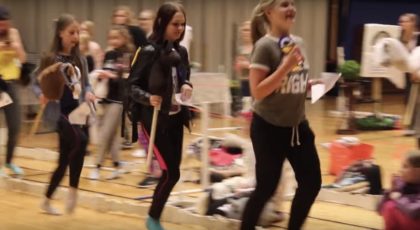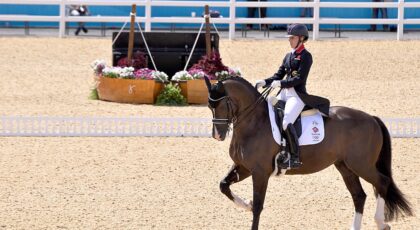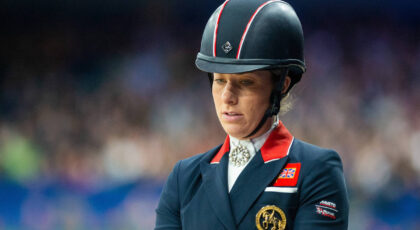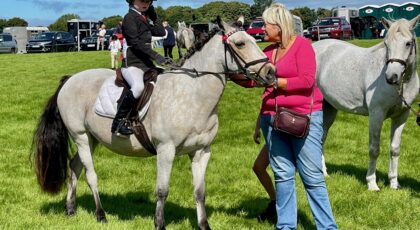To pass time in self-isolation during the COVID-19 crisis, I cleaned my favorite bridle.
It belonged to the horse I knew the longest, the one that changed my life.
Carabela was a red Peruvian Paso mare, born in my grandmother’s barn when I was three-years old. The two of us grew up together.

Like many mares before her, Carabela was all fire and speed. She had a fierceness I keep in my pocket when I need it, but was not above a good cuddle. More than once, she almost killed me. But she also seemed to love me when it felt like very few did. It was as if there were two different horses packed into her 14.2 hand body.
Carabela was put down the day after this year’s Super Bowl. The two of us parted forever after 27 years.
As I pulled her bridle out of the makeshift plastic “tack box” stuffed underneath my desk, Carabela had one last gift to give me.
At first, I reveled in the feeling of the leather between my fingers. The familiar grip of the sponge across the braided reins reminding me of the horse person I still was even if there wasn’t a horse to be seen for miles. The smell of Carabela’s sweat from long-gone summers wafted up at me as I unclipped the buckles and cleaned underneath them.
I left Colorado and Carabela five years ago to pursue a life as a writer. I return every year to visit, but I live now in a studio apartment on Chicago’s northside—my view is of a back alley and a neighbor’s garden. When I looked up from my cleaning, I saw a pair of mourning doves snuggled together on the telephone wire as if mocking me with their closeness. Then the nasty resentment I have fought with since the shelter in place order went into effect roared through me.
It has been 30 days since I last saw a horse. Thirty days since I decided that the best thing to do was stay out of the barn where I take lessons because statistically, the majority of horse owners are women over 50 and more likely to get much sicker from COVID-19 than I am.
It has also been 30 days since I saw coworkers, swam in the local pool or did many of the things that made my little patchwork life whole.
My brain’s chosen coping strategy for this troubling time is to be real, stinking resentful. I resent those who can still ride and those whose horses can greet them in the morning, even if it’s just to ask for breakfast.
And my disgruntled feelings aren’t just horse-related. Nope.
I go for walks and I am resentful of those with dogs, those with the money for one-bedroom apartments with balconies, those with stable romantic relationships, those with job security, and those who think running is fun.
But I know my bitterness is just grief and fear in disguise. I am grieving the loss of normalcy, security and connection with the animals and the people I love. As events are canceled, shops get boarded up, unemployment skyrockets to unprecedented levels, and the number of sick continues to rise, I realize that most people are scared and sad too.
Looking down at Carabela’s bridle, I understood I was grieving her as well—and it reminded me that this is not the end. Just as that little red mare taught me the many times she dumped me in the dirt: if we fall, we must do our best to get back on.
We will ride again.
We will return to our beloved horses. We will find the dirt underneath our fingernails and feel the pressure of our heels lowering behind the stirrups. We will hook lead ropes and unlatch gates. There will still be horses looking for treats and horsey friends to share stories with.

Perhaps when we return, we’ll even be improved by this experience.
Perhaps we can be a bit kinder to each other. Maybe in our gratitude to be back, we can be more generous and inclusive. We can look at each other and see that each choice is complicated, nuanced and hard-fought, even when we profoundly disagree with it. We can worry about the things that really matter and shed off the things that really don’t.
There will be much work to be done when we are let out of our homes again. There will be a need for help and healing for many. We will need to dig deep for as much compassion, gentleness and passion we can muster, not only for each other but also for ourselves when no one else is watching.
I will never see or ride Carabela again. I will never again get to hear her snort and watch her race up the hill among the aspens along my grandmother’s road. I will never get to play with her loose lip when she relaxed next to me.
But I get to keep all that she once was. Because of Carabela, and many other horses and people, I will ride again when this is over. I hope I will ride better, too.
Gretchen Lida is an essayist and an equestrian. Her work has appeared in the Washington Post, the Rumpus, the Los Angeles Review of Books, and many other publications. She is also a contributing writer to Book Riot, Horse Network, and the Washington Independent. She is working on her first book. She lives in Chicago and is still a Colorado Native.




 April 15, 2020
April 15, 2020 




























